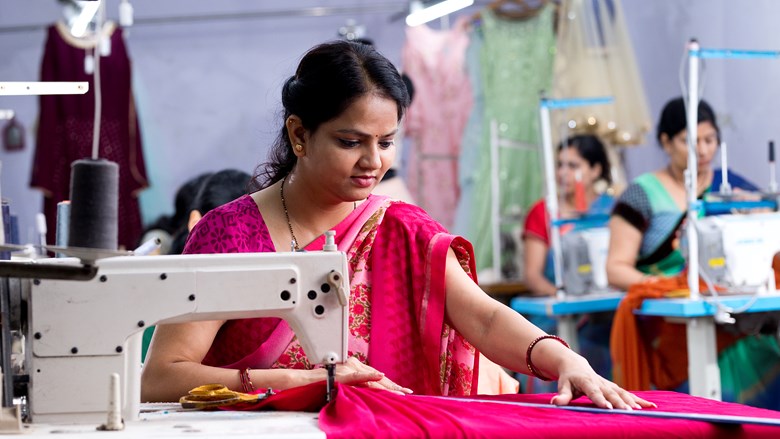Pseudo-Solutions for Union Freedom
Launch report by Just Solutions

Works Committees (WC) are legally required in Indian factories with more than 100 workers. This also applies to the garment sector, where many WCs are active. Commissioned by Mondiaal FNV, British researcher Stirling Smith investigated whether these committees could play a role in promoting the establishment of unions. Unfortunately, his answer is no.

Photo: iStock/triloks
In many Indian states, unions face significant challenges: they are suppressed and kept weak. This is also true in the Indian garment industry, a sector where Mondiaal FNV actively supports unions. Many clothing brands, multi-stakeholder initiatives, and NGOs view WCs as potential substitutes for unions to advocate for workers’ rights, assuming they can “bridge the gap” until unions are free to operate fully. However, less than 5% of workers in the Indian garment industry are union members, due to factors like repression. This raises the question: is this assumption correct?
Raising Voices Through WCs
In addition to conducting literature reviews, Stirling Smith interviewed multi-stakeholder initiatives, workers’ rights organizations, and Mondiaal FNV programme partners. He also spoke with project leaders who assist in establishing WCs. His research, The Right to Organise or the Right to Talk? Workers’ Agency in Indian Garment Factories, included studies in Tiruppur, a city in Tamil Nadu, a southern state with a significant garment production industry. “Indian law requires factories with over 100 workers to establish a WC,” explains Smith. “The management is also represented in these committees.”
Addressing Individual Issues
One of the study's main findings is that WCs do not perform the same functions or wield the same power as unions. “I found that employers do not allow these committees to function fully. Workers on these committees mainly focus on resolving individual issues, such as leave requests or overtime payments. Given the many issues in these factories, it’s important to resolve them quickly. Other studies reveal that WCs do not meet frequently enough, and workers are not always granted leave to attend these meetings. They are not compensated for the extra hours either.”
WCs Often Reduced to Suggestion Boxes
Another major limitation, according to Smith, is that WCs cannot collectively negotiate working conditions or terms of employment. “They are not allowed to, according to Indian law. The International Labour Organization (ILO) also stipulates that collective bargaining is the sole domain of unions. While WCs can engage in social dialogue about working conditions, they tend to function only at the level of a suggestion box. This is largely due to fear. Since management is part of the committee, workers fear losing their jobs. Even slightly critical voices can have consequences.”
Anti-Union Sentiment Hinders Growth
To Smith’s surprise, there is no connection between WCs and unions. “I always assumed that if we trained workers to actively participate in WCs, they would naturally transition into union activities. That’s not the case—we found no evidence of this.” He emphasizes that anti-union sentiment in various states hinders union growth. “The state of Tamil Nadu, where this research was conducted, is not union-friendly. Unions are required to register, which is time-consuming. Some unions are now taking legal action because the government deliberately lets registration deadlines expire.”
Elections Foster Connections with Colleagues
Smith recommends that unions encourage workers to run for WC elections and support them in doing so. In many factories, elections do not even occur; workers are simply appointed. “In Bangalore, where unions operate at the city level rather than the factory level, they advocate for WC elections. Elected members have stronger connections with their colleagues. This increases solidarity, for instance, during strikes initiated by unions.”
Gender Equality Must Be Central
Smith’s research highlights the importance of addressing gender equality in improving union efforts in India’s garment sector. “Sexual harassment occurs daily in the textile sector. Issues like childcare facilities and maternity leave are often unaddressed. The more women in union leadership positions, the better working conditions will be for female workers.”
Supporting WCs Alone Is Insufficient
Policy officer Katrine Danielsen of Mondiaal FNV welcomes the research. “This report helps us understand worker representation in the Indian garment industry,” she says. The findings demonstrate how WCs address immediate workplace issues and encourage workers to speak up. However, the study also shows that WCs do not necessarily help workers connect with unions, establish unions, or exercise their right to freedom of association. “This is an important finding for us and other organisations supporting unions and workers' rights. It shows that supporting WCs is not enough. We must do more to support unions and promote freedom of association in this important sector.”
We are publishing this research deliberately on December 10, the United Nations’ International Human Rights Day. The right of freedom of association is a fundamental part of human rights.
Read more on trade union's rights: